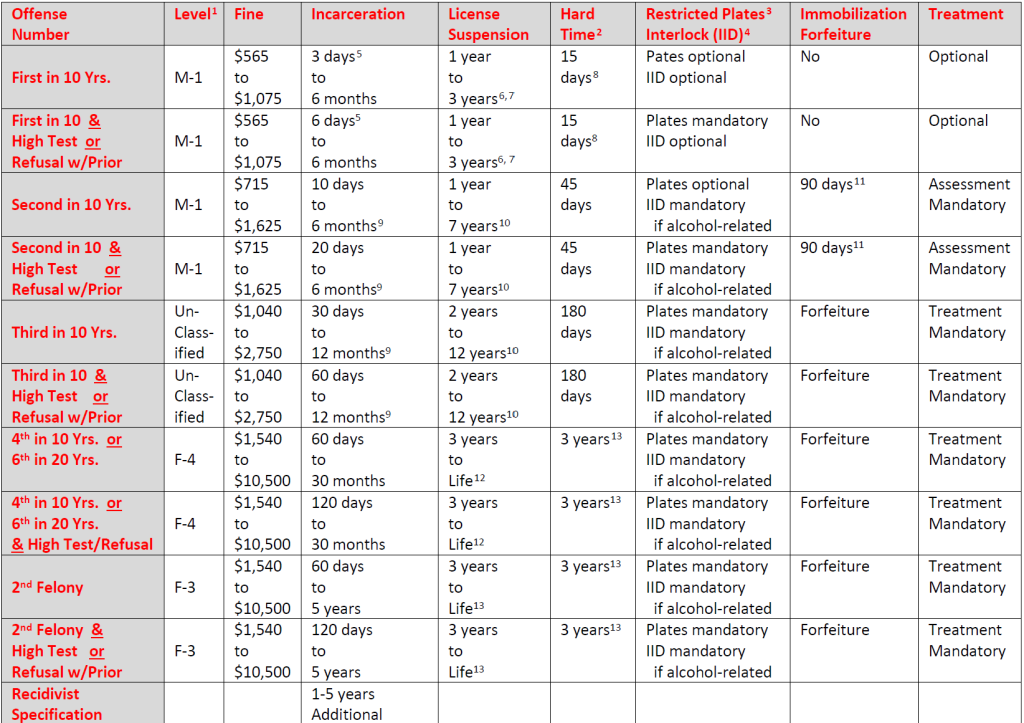An Ohio man was recently arrested for DUI (called ‘OVI’ in Ohio) for the 20th time. If he is convicted of OVI, his prior OVI convictions will affect the sentence in the current case. This article discusses sentence enhancement and other consequences of repeat OVI convictions in Ohio.
The 20th Time
According to 19 NEWS, a police officer observed a vehicle being driven at erratic speeds. The vehicle was driving 15 mph in a 25 mph zone. It then sped-up and then slowed to 15 mph in a 35 mph zone. The officer conducted a check of the vehicle’s license plate and learned the owner of the vehicle had a suspended driver’s license. The officer initiated a traffic stop, made contact with the driver, and smelled a strong odor of alcohol.
The officer ultimately arrested the driver for OVI (Operating a Vehicle under the Influence). The driver had been previously been arrested for OVI/DUI 19 times. It is unclear how many of those arrests resulted in convictions.
Sentencing for Repeat OVI Convictions
Ohio has mandatory sentencing for OVI convictions. The mandatory sentence includes a fine, a term of incarceration, and a driver’s license suspension. The mandatory sentence may also include the use of an ignition interlock device, the installation of restricted (yellow) license plates, substance abuse treatment, and vehicle immobilization or forfeiture.
The mandatory sentence for an OVI conviction is enhanced with each conviction within ten years. On the fourth conviction within ten years or the sixth conviction within 20 years, an OVI offense is elevated from a misdemeanor to a felony. The following table summarizes potential sentences for OVI in Ohio.

Ohio OVI Habitual Offender Registry
When a person is convicted of OVI in Ohio, the court transmits conviction information to the Ohio Department of Public Safety. The information includes the identity of the offender and the offender’s number of OVI convictions in the last 20 years. An offender who is convicted of OVI, or an equivalent offense, five times in the last 20 years is added to the Ohio Habitual OVI Offenders Registry. The registry contains the offenders’ name, address, and date of birth and can be searched by the public.
Involuntary Blood Draws for Repeat Offenders
According to Ohio Revised Code section 4511.191, the implied consent law is different for a person arrested for OVI who has two or more prior convictions in the past ten years. An officer is not required to advise such a person of the consequences of taking or refusing an alcohol/drug test. Instead the officer advises the person that, if the person refuses to submit to a chemical test, the officer “may employ whatever reasonable means are necessary to ensure that the person submits to a chemical test of the person’s whole blood or blood serum or plasma.”
The practical effect of this law is the officer will obtain a search warrant for the person’s blood, the person’s blood will be drawn by a medical professional, and the blood sample will be analyzed by a crime lab. The person will by subjected to an Administrative License Suspension for refusing a chemical test, and the person will face a charge of OVI ‘Test Refusal with Prior Conviction’ in addition to the charge of OVI ‘Impaired’.
Representation for Repeat OVI Offenses
Even if it is not a person’s 20th arrest, repeat OVI convictions have enhanced sentences and significant collateral consequences. A person facing an OVI charge would be well-served to consult a lawyer with expertise in OVI defense.
About the Author: Shawn Dominy is a leading OVI lawyer in Ohio and the founder of the Dominy Law Firm in Columbus, Ohio. He can be reached through his law firm’s website: Dominy Law Firm.